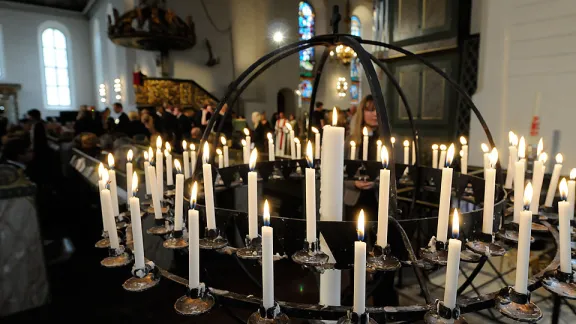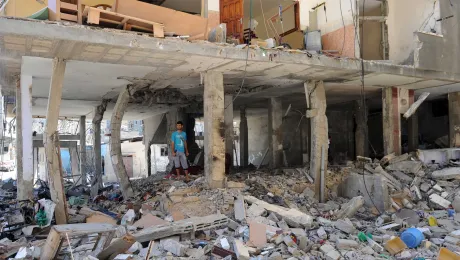
24 July memorial service in Oslo cathedral for the victims of the terrorist attacks © Gunnar Grøsland
Lutheran Leaders Call for Reconciliation at St. Olav Festival
The President of the Lutheran World Federation (LWF) Bishop Dr Munib A. Younan has called Norway a beacon of hope and inspiration for the way it has dealt with the horror and pain of the Utøya massacre.
Younan, the bishop of the Evangelical Lutheran Church of Jordan and the Holy Land, was speaking at the week-long St. Olav Festival running from July 28 – August 5, following the one-year anniversary of Norway’s deadliest attack since the Second World War, where an anti-Muslim extremist killed 77 people in two separate attacks.
“You have shown, in the way you have processed the horror and pain of 22 July 2011 that you do not accept violence as a means of obtaining social and political change. You represent today—in our tested, pluralistic world—values of social justice, multiculturalism and unity in diversity,” he noted.
“In this way, your country represents a beacon of hope and a source of inspiration also for us [in the Middle East], whose pluralism has still not reached the level of maturity, which is foundational for peace in any country.”
Younan is participating in the festival, which this year focuses on justice, reconciliation and interreligious dialogue—along with the Church of Norway Presiding Bishop and LWF vice-president Helga Haugland Byfuglien.
In an interview, Bishop Byfuglien said that it had been important for the church to be able to speak to the grief and sense of loss caused by the killings, while bearing in the mind the biblical notion that the darkness ought not to overcome the light.
“In Norway, we experienced how in the midst of the deepest grief and sadness, in the midst of the heavy silence over towns and villages, whispers were heard, growing louder with each voice, and speaking the important words: love and dignity,” Bishop Byfuglien said.
“People came together to share their grief and to create the light that arises when we come face to face. The church has been challenged on its view of reconciliation and has had to reflect on that,” she added.
Bishop Byfuglien said that Christian faith is not just spiritual. Christians have a responsibility towards the world and that justice offers a way of responding to those responsibilities.
Speaking at the St. Olav Festival in Trondheim on 30 July, Bishop Younan, said the good news of God’s reconciling love in Jesus Christ remains constant but must be engaged in the broken world differently in every age.
“When we look at our world today, we can easily be overwhelmed by what we see. Nevertheless, the Church must—together with other major religions—be a prophetic voice for peace and justice. I am confident that the religious communities working together can make a lasting contribution to the many great challenges facing the human family today.”
The LWF president said that in a world where extremism prevails the church is called to promote respect and be a driving force for peace that is built on justice and reconciliation, truth and forgiveness.
Islam, Judaism and Christianity are not the problem; the issue is that certain individual followers of these faiths go against their core teachings of love for God and respect for others.
“When mainline Christians, Muslims and Jews—especially their leaders—remain silent and timid about these core values, they allow themselves to be held hostage by the extremists, and they contribute to the problem.
“This is the reason I call on religious leaders to be prophetic. Religious leaders from every faith and ethnicity must have the courage to stand up and say to their own extremists that any violence done in the name of God or religion is blasphemy,” Younan said.
For her part, Byfuglien said the Church of Norway has, despite losing its status as a state church, become an active player and contributor to the national commemorations around the acts of terror of a year ago. People have sought out the church’s view and listened to it.
“Maybe the church has been confirmed in the knowledge that it means a lot to society, also to people who don’t normally seek it,” she noted.
In addition, the outpouring of condolences from churches worldwide following the tragedy has helped the church to confirm that it is part of a global community. “It reminds us that little Norway, which in many ways is used to being a peaceful and safe place on earth, both needs that fellowship and depend upon it.”


